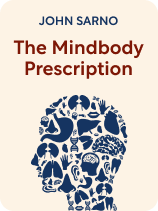

This article is an excerpt from the Shortform book guide to "The Mindbody Prescription" by John Sarno. Shortform has the world's best summaries and analyses of books you should be reading.
Like this article? Sign up for a free trial here.
What’s the definition of psychosomatic illness? How can the mind influence the body?
The definition of psychosomatic illness is a physical condition, often chronic pain, that arises due to psychological factors and repressed emotions. To understand how to treat these illnesses, you need to understand where they come from.
Continue reading to learn more about psychosomatic illnesses and why they happen.
What Are Mindbody (Psychosomatic) Conditions?
Author and physician Dr. John Sarno explains that the term “psychosomatic” has some negative connotations, which is why he prefers the synonym “mindbody.” The definition of psychosomatic illness is a set of physical symptoms that are real and result from emotional or psychological factors. The “psych” in “psychosomatic” (and the “mind” in “mindbody”) doesn’t mean a patient is faking or imagining their physical symptoms.
(Shortform note: Some experts agree with Sarno’s objection to the term “psychosomatic,” for several reasons. First is the stigma that Sarno describes. Second is that it paints the body and mind as entirely separate. In reality, they argue, everything the body does and experiences involves the brain—meaning that every physical ailment could be described as somewhat psychosomatic. This takes Sarno’s concept of the mindbody connection a step further to suggest that the mind and body aren’t just connected in cases of chronic pain, but rather are connected in all cases of physical ailments. These experts also suggest that calling symptoms “psychosomatic” gives doctors an excuse to not look deeper into their causes.)
The specific physical reaction that causes this pain, Sarno concluded, is that the emotional tension causes the brain to send signals to the autonomic nervous system (which controls the body’s circulation) to reduce the flow of blood to certain muscles. This reduced blood flow deprives the muscles of oxygen, which results in pain. Reduced blood flow can cause pain and other symptoms, but it doesn’t damage tissue, nor does it necessarily result from damaged tissue. This meant that TMS conditions were ultimately harmless: They weren’t reflective of bodily damage, nor would they cause bodily damage if left untreated.
(Shortform note: Readers may object to Sarno’s use of the term “harmless.” While TMS may not directly result in tissue damage (the way that, for example, walking on a broken leg would cause tissue damage), chronic pain can take a toll on a person’s mental and physical health. Research suggests it can lead to depression and anxiety and makes a person more likely to develop substance abuse disorders or have suicidal ideation. By this measure, chronic pain can be deadly. It can also impact a person’s standard of living by reducing the amount of work they can do, and thus, their income. Additionally, chronic pain activates the body’s stress response, and long-term activation of this response can cause inflammatory cells to damage bodily tissues.)
He drew this conclusion based on the fact that treatments that increased blood flow to the affected tissues—such as heat therapy, massage, and exercise that targets those muscles—could temporarily relieve the symptoms of chronic pain conditions. If there were an abnormality or if tissues were physically damaged, these treatments would have been ineffective.
Again, his experiences with patients seemed to confirm his theories. Since the brain can alter the body’s blood flow in seconds, Sarno found that his mindbody treatments (which we’ll detail later in the guide) often provided near-instant relief to patients. The conditions many doctors blamed for their patients’ pain—for example, structural abnormalities, injury, and inflammation—take time to heal, so it wouldn’t be possible to achieve instant pain relief from these.
Personality Traits: Who Is Predisposed to TMS?
Psychoanalytic theory helps explain why the mind represses some emotions and why the body translates those emotions into physical pain. However, everyone has repressed emotions, but not everyone suffers from TMS. According to Sarno, some personality traits are especially associated with TMS. These tend to relate to feelings of inadequacy and the need for approval from others. They include perfectionism, self-criticism, low self-esteem, conscientiousness, ambitiousness, and the desire to be a good person and to please others (which leads to guilt when these desires aren’t met).
These traits are characterized by pressure on oneself, explains Sarno, and this pressure enrages the child part of the mind because the child wants to be free of responsibilities and expectations. Because rage is the primary emotion these traits engender, and because these traits are practically universal in people suffering from TMS, Sarno concludes that rage is the primary repressed emotion that causes TMS.
| The Role of Rage, and Character Traits That Make It Easier to Cope With Pain Some experts suggest that anger is the primary emotion associated with narcissism (and as mentioned earlier, the child is strongly characterized by narcissism). This supports Sarno’s identification of the narcissistic child as a source of rage. They go on to explain that this rage likely stems from the narcissist’s (or child’s) perception that others’ behavior (such as the impositions of the parent) threatens their sense of entitlement or disrespects their authority. So, for example, when the parent demands perfection from the child, the child feels disrespected and becomes enraged, and the conscious mind represses this rage, leading to pain. A helpful tool, then, may be to exercise greater self-compassion and avoid judging or punishing yourself (and your mind’s child) for your imperfections. Some experts also suggest that there are certain personality traits you can cultivate to help you better cope with chronic pain. In particular, research indicates that training yourself to have a zest for life—a feeling of liveliness and energy for your own life and the lives of others—improves “self-efficacy.” Self-efficacy refers to a sense of being able to handle the challenges of life, and it’s shown to improve daily functioning despite pain. It also correlates with lower rates of depression and anxiety. Activities like journaling and monitoring your thoughts and behaviors can help you cultivate zest and self-efficacy, which may counteract some of the traits Sarno identifies as predisposing one to TMS. |

———End of Preview———
Like what you just read? Read the rest of the world's best book summary and analysis of John Sarno's "The Mindbody Prescription" at Shortform.
Here's what you'll find in our full The Mindbody Prescription summary:
- A look at the chronic pain epidemic that's plaguing the Western world
- That the key to solving your pain is resolving your emotional tensions
- Why modern medicine doesn't recognize mindbody connection






